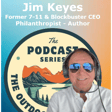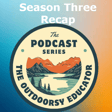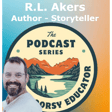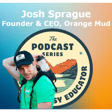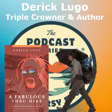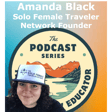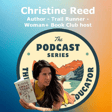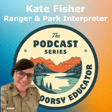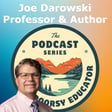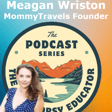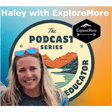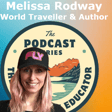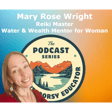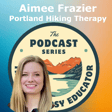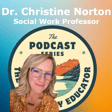Become a Creator today!Start creating today - Share your story with the world!
Start for free
00:00:00
00:00:01

Liz Kaltenhauser
In this week's episode, Alasdair talks to Liz Kaltenhauser, a marine animal specialist whose passion is bringing the wonders of the sea to children who live many miles from the coast.
Recommended
Transcript
Introduction to the Outdoorsy Educator
00:00:02
Speaker
Welcome to the Outdoorsy Educator podcast, the show where curiosity meets the open road. I'm your host Alistair and I invite you to join me as we explore the world through travel, adventure, nature and the power of learning. Each episode we dive into inspiring stories from adventurers, educators and global citizens.
00:00:24
Speaker
Whether it's in a classroom, on a local trail, or adventuring halfway across the world, there are stories to be told and lessons to share. So pack your curiosity, lace up your boots, and let's discover how the world can teach us all one step, one story, one adventure at a time.
Liz Coltenhauser's Journey into Marine Biology
00:00:46
Speaker
Liz Coltenhauser, affectionately nicknamed Fish as a child growing up in Minnesota, was drawn to the water from an early age. Her deep love for animals naturally led her to pursuing marine biology, a path that briefly took her to Florida.
00:01:02
Speaker
There, she quickly realised a stark disparity. Students in inland states like hers often lacked access to the same marine science opportunities as those on the coast.
00:01:12
Speaker
That realisation sparked a passion for education that has shaped her career. After seven years as an educator and animal care specialist at an aquarium, Liz continues to thrive in her true calling, bringing the magic of marine wildlife to children who live far from the ocean, empowering these students and planting seeds of wonder about the natural world.
00:01:35
Speaker
Well, Liz, thank you very much for joining us today. How are you? I am doing fabulous. How are you doing today? Yeah, doing very well. It's been ah a busy day, but a good day. And we're going to end on a good note. I've been looking forward to this conversation all day. So thank you so much for being here. ah Of course. Thanks for having me on.
00:01:56
Speaker
Awesome. Well, why don't you start off by telling us a little bit about yourself, where you're from, you know where you grew up, and how you got into what it is we're going to be talking about today.
Scuba Diving Experiences and Challenges
00:02:05
Speaker
Yes.
00:02:06
Speaker
ah So my name is ah Elizabeth. I go by Liz, though. Some of my friends call me Lizard, but that is because I have an animal background. so right And I actually have worked with lizards in the past, so that's where got my nickname.
00:02:20
Speaker
But I actually am currently located in Minnesota. soda I was born and raised here in the Twin Cities area. There's a little suburb of Minneapolis.
00:02:31
Speaker
And i always just grew up loving being outside, loving being in the water. There's just such a serene peace from being under the water that I have found. So I did everything I possibly could to be in the water as much as possible. Some of that included...
00:02:47
Speaker
you know, swimming. I did some competitive swimming once I joined middle school. all And then as I continued, I actually found this sport called synchronized swimming. It's pretty cool.
00:03:00
Speaker
A lot of people don't think it's a sport. It actually is. It's like running a marathon while holding your breath for half of it. It's genuinely difficult, but it did give me that thrill of being underwater.
00:03:12
Speaker
And I just loved it. And as I was in synchronized swimming and being in the water, i kind of slowly started to develop this love for the oceans and develop an ecosystem that I have actually never seen.
00:03:26
Speaker
And I didn't get to see until I was a freshman in high school school when we went to California. And even then, I couldn't even swim in it because California waters, it's very cold. The Pacific ocean is actually very cold. And right it really is. And so I didn't really get an opportunity to actually be in the ocean until my sophomore year of high school, school when I was offered a opportunity to get my scuba certification and go on a trip with some other high school students. And it was a pretty expensive trip, but
00:04:01
Speaker
1000% worth it. We got to get scuba certified. And then we developed our skills here during the summer. And then for one week, we got to go out to ah the Grand Cayman Islands, Grand Cayman specifically.
00:04:17
Speaker
Yeah. That's a good place to start. Yeah. Yeah. So you could say that my open water diving experience, like my first ever certification, they call it like a spoiled diver when you get to kind of experience one of the best places to scuba dive.
00:04:35
Speaker
in your first go around. And it was a great opportunity. I learned so much. And that's when it hit me that this is what I wanted to do, like forever. And it was a little scary at first too, though, when you're diving in such a large body of
Career Moves and the Impact of COVID-19
00:04:54
Speaker
water. i had you know grown up on lakes. And so this ocean was this massive thing that, you know,
00:05:01
Speaker
And it, you know, dive
00:05:11
Speaker
and you know found that my first ever dive i did um i actually got a close hand experience with what could go wrong in scuba diving. Really? I'd love to hear more about that. Yes.
00:05:27
Speaker
okay So the when you learn about scuba diving, you learn about the ocean, you learn about PSI, pressure per square inch, right? And we we talk about that a lot with like airplanes. If you go up in an airplane, you you're going to start feeling that pressure on your ears. And so they naturally, as we call pop, you they pop your ears.
00:05:45
Speaker
And so when you are diving into the depths, of the ocean, even if you're like 20 feet under the under the surface, you're actually going to plug your nose and you're going to equalize your ears. This is normal for scuba diving.
00:05:59
Speaker
And so what they don't tell you, though, is your first equalizing your ears doesn't work very well. And Uh, it's, it's, it's especially difficult if you never had to experience that kind of depth before, even the only one time I had been on a plane. So my ears were not very suited for this kind of experience. So there I am trying to go down. Oh, there's some pain in my ear. Okay. I'm going to come back up.
00:06:30
Speaker
re-equalize, re-pressurize my ears, then go back down. It was still causing me so many, so many issues. I was in a lot of pain. um And so I was like, maybe this is normal and I just have to get over it. And so I spent the rest of my dive in immense ear pain only then to find out like five years later when I get my ears checked just to make sure you know I can hear and everything course dive physical um for a job with diving uh one of the tubes in my ears had shriveled up from the pressure in the ocean um which was why I was feeling all of that pain so I can still hear but now I'm just very loud
00:07:15
Speaker
right yeah so it's left some permanent but damage but and a permanent yeah lasting effect yeah just a little bit but you know what it's I so i still do it I currently so uh kind of I went on a little bit of a tangent i I do that on times but this is the perfect scenario for it yeah okay yes yes Awesome. So going back a little bit more to my experiences after doing scuba diving and knowing this is what I want to do, I then started to pursue marine science and knowing I really couldn't do that in Minnesota. So I ended up packing everything up, going to Florida, going to school, and I didn't do very well with with the school stuff like the book smarts.
00:08:03
Speaker
Right. wasn't very good at it. They put me on academic probation and I said, you know what? it's not worth the $30,000 a year for me to do this. So i went back home and finished my degree online in biology he and environmental science, and then worked at the local aquarium for a little bit longer before making that permanent leap to Florida.
00:08:28
Speaker
And I lived in Tampa, And I worked with fish and I got that marine science experience. I had the degree. I was living what I dreamed I wanted, you know, since I was little. I was working with fish.
00:08:41
Speaker
I was living by the beach. It was perfect. But what they don't tell you is what do you do after you accomplish that dream? And then you realize that's not what... That's not what you, that's what you thought you wanted.
00:08:55
Speaker
But then you realize after you do it for a while, it's, it's not fulfilling you. And, you know, that could also be said about the, the pay too. Cause I was in the midst of COVID only working half the amount of hours normally, just going in to make sure the animals are fed and then leaving. So you're getting $13 an hour for four hours, sorry, four hours a day, so 16 hours a week. And it became really difficult to sustain that. And so I had to make that difficult decision for my financial wellbeing to move home back to Minnesota. And I kind of, you know,
00:09:37
Speaker
tail between the dog's legs kind of ran back to Minnesota to regroup a little bit, but I still got to spend a lot of time outside. I got to do a lot of diving. I still dive to this day.
00:09:48
Speaker
And I am now a part-time diver at my local aquarium. So I'm still diving and I still get to go out and do scuba cleanups and all of that stuff out in the lakes. And it's really, really rewarding.
00:10:01
Speaker
But I realized that my experience is very similar to other people's experiences when it comes to being in a landlocked state.
Founding of WAVE Nonprofit
00:10:11
Speaker
Basically realizing that I had to leave my favorite place, which is my home, to go to another half of my soul, which is the ocean. I had to travel and move away from the other half of my soul to accomplish what I wanted to accomplish. And I don't think that that should be the case. And so I founded a nonprofit.
00:10:33
Speaker
And this is recently, like all of our paperwork just got put in in April. So we're hitting the ground running. It's very new. And what we're trying to accomplish is taking that ocean and bringing it closer to students in these landlocked states.
00:10:50
Speaker
Because I had the privilege to be able to you know, pay for a $3,000 trip, get the $600 scuba certifications, get a job at one of the only aquariums in my state, as well as, you know, work with animals at that aquarium as well. So there's just few, few opportunities here.
00:11:13
Speaker
And there's even fewer when it comes to other environmental conservation groups as well, because most of those are notoriously difficult to get into specifically here in Minnesota.
00:11:25
Speaker
And so the goal of our nonprofit is to be able to give students that opportunity without having to worry about the paycheck, without having to worry about the pay of that program, like how much it would cost, basically. and And right so one of our big pro projects that we're currently working on that we're fundraising for is a live stream scuba dive.
00:11:50
Speaker
So we have divers go out in Florida and they would do a live stream workshop where they're talking to the camera. um And on the other end of that camera are students from landlocked states who have one, never seen the ocean.
00:12:03
Speaker
Two, don't have the opportunities to even visit an aquarium to get that opportunity. And three, be able to ask questions to that diver and get real time results and real time answers.
00:12:16
Speaker
So this is kind of the big project. And it's just trying to give that experience and give that ecosystem to the students and open up their world a little bit, if that makes any sense.
00:12:28
Speaker
it It makes perfect sense. I mean, this is a ah fascinating story. And I've got so many questions. i So i think I think, no, no, no, this is wonderful. I think I'm going to go kind of just almost chronologically. I will say, first of all, it's it's a bit of a coincidence that you're from Minnesota because it was just last week, I think, that I saw that Minnesota had cracked the top 10 for the world's happiest cities to live in in the world.
00:12:56
Speaker
And it was one of the first American cities, if not the first American city to do it. And it was really not... not water related, but parks, cycle paths, outdoor activities, despite it getting pretty cold in the winter.
00:13:11
Speaker
yeah you know I've only had a layover in Minnesota. I've been all around it, but never just a layover at your airport in Minneapolis. um But it does seem kind of like an outdoorsy place.
Ocean Fears and Outdoor Education
00:13:23
Speaker
You know, there is a lot to do. Yes. I mean, there's... We're also just... ah We're like a different breed of person. a lot of people, we have that iconic saying of Minnesota nice, which...
00:13:37
Speaker
you know Sometimes a lot of us Minnesotans are like, is it niceness or is it passive aggressiveness? Either way, though, like i would if I could give my kidney to my neighbor because I love my neighbor, I would. you know We have that kind of mentality, but we're the land of 10,000 lakes. And even that, we're being Minnesota nice.
00:13:56
Speaker
It's not really 10,000 lakes. It's actually over 1,100 11...
00:14:01
Speaker
thousand lakes. That's right. And Wisconsin is still trying to argue that they have more, but they call ponds lakes. So I don't think- Who's right and who's wrong here? That's really the thing. Kind of like friendship, sibling rivalry kind of with Wisconsin a little bit, but with that much shoreline- I mean, we spend more time outside than we do inside, even in the in the middle of, you know, negative 40 degree weather in the cold and the snow. you're still finding kids going outside to play in the snow and going skiing. We have so many ski hills here, which is kind of crazy considering we're not mountainous at all. We have more plains than we do mountains.
00:14:45
Speaker
Right. yeah. We still have plenty of hills, though, that we go skiing. I mean, it's part of our whole regiment with schools is when I was in elementary school, we would go sledding. We would go to Valley Fair, which is just kind of like, you know, our six flags. So it's just roller coasters and stuff.
00:15:03
Speaker
We would do that. And then in middle school, that's when you start, you know, you do overnights at the zoo. You do you do more like iconic type of stuff where you go. We had this thing where we go camping for a week in the summer.
00:15:17
Speaker
And then we also had a winter retreat as well, where you go camping in the winter, but like inside a cabin. And then in high school, I got to go scuba diving. So like even the schools, they do a really good job at promoting being outside, which is really awesome. It's just unfortunate that when you spend all this time outside, there is...
00:15:38
Speaker
not that much education about what you're seeing and how you can protect it. And that's kind of where we're kind of bridging that gap a little bit. Well, that's a wonderful gap to bridge. Yeah, absolutely. yeah Something that needs to be done.
00:15:54
Speaker
um i always think that this is an interesting thing about the United States is you sometimes i how big it is here. I'd be curious to know if you happen to know the number.
00:16:07
Speaker
If kids go outside during school for recess, what's the kind of cutoff temperature? that they're not allowed to go. Yeah. Um, so when I, when it's in Minnesota specifically, uh, we don't really get really hot, hot days during our school years because we're ending in, you know, beginning of June is usually when we stop. And this is just Minnesota. I know and when I lived in Florida, my friend was a teacher there and they end in like mid May.
00:16:36
Speaker
um And so because we're ending around there, you might see you know couple 80 degree weather days in Minnesota for recess. But when it comes to the cold, that's when you start really having to kind of cut that recess time and My dad actually used to be a recess monitor for my elementary school way back in the day.
00:16:58
Speaker
um So right I'm a little familiar with the cutoff. I and believe it has to be ah below zero is when we usually say, okay, we have to look at it. However, if it's been really cold, like negative 10, 20 with the wind chill, obviously. So the wind is blowing and then all of a sudden you get negative like one or two degrees.
00:17:23
Speaker
and no wind, yeah, the kids could go outside and play. ah see um just yeah We monitor the weather a lot here, and surprisingly, our weather can be notoriously and ah just radically changing.
00:17:38
Speaker
um And I think this is you know predominantly the similar with other United States as well, like other U S states as well. I know Florida was like that too, but you could have one day where it's, you know, negative 40. And then I've, I've seen this where it's negative 40 one day. And then the next day it's like 32 degrees.
00:17:55
Speaker
then the next day is like 70 degrees. And then the next day again, dips way below under freezing again. Right. Okay. Someone tell me if I can take my shorts out or not, because this is too much.
00:18:06
Speaker
ah Make up your mind. We've had a few of those kind of weekends or three or four days where it's been a 50 degree, 60 degree swing. um Oh, my gosh. you know we i live just north of dallas and we've got you know people hear from all over the warmth of course but all over the state and northerners like my dear wife will sometimes scoff at the fact that it's a thirty two degree cutoff here it's to below thirty two degrees the kids don't go outside they're They're not hard. they're Yeah, exactly. They're not hard in Minnesotans, you know. Yeah.
00:18:40
Speaker
yeah Well, in 32, we're out in shorts um in the wintertime. Right. It's just, yeah it's a different world straight up the road. It's so it's so interesting to me.
00:18:51
Speaker
Just, I could hop in my car and, you know, just not not really all that far away. It's a completely different mentality. Yeah. um Yeah, to find interesting it can.
00:19:03
Speaker
You can change, though, pretty quick to like I wouldn't say that this is like the hardiness of Minnesotans or even like Alaskans I know are the same. But, it you know, it doesn't it it doesn't happen over years and years and years. I went to Florida and I only lived there for three years.
00:19:20
Speaker
And by my second year, if it had dipped below 50 degrees, I had to take out my winter coat because I was getting cold. And so and right I was getting a lot of heat from people back home. They were very, very mad at me for pulling out my puffy coat in 50 degrees when it was clearly under 20 degrees back home.
00:19:41
Speaker
But it was right part of it. They were tea teasing you rightly, I'm sure. Yes, absolutely. Absolutely. Now talk to me a little bit more about this first time. like they like Tell me
Overcoming Ocean Fears: Advice and Anecdotes
00:19:54
Speaker
if I'm right here. The first time you, other than California, when you got your feet in the ocean, you got out in the ocean, it was in the in the Caymans.
00:20:02
Speaker
Is that correct with the scuba? I'm curious as to the emotions of that, because it sounds to me like that was probably something you had spent most of your life gearing towards that moment. So how did that feel to actually have that come true?
00:20:17
Speaker
Well, see so the Grand Cayman is a 22 mile island. The first time I saw the ocean from the, I got a window seat. So in the air, in the airline, in the, on the plane, I, you you come down and you don't see the runway. It just looks like you're going straight into the ocean.
00:20:37
Speaker
So there was some fear there. um But I saw the ocean. I got off the plane and the ocean's right there. And you just smell the air. And even to this day, if I even get a little bit of that smell from either my time in Florida or in the Cayman Islands...
00:20:56
Speaker
If I smell that same smell, it literally, like, it makes me cry. It's it's such an emotional like experience to just know that that's where you know you belong, but at the same time, Minnesota is your home and you don't want to leave it. It's it's strange.
00:21:14
Speaker
You feel very torn. But the first time I got into the ocean, i had a lot of fear running through me because I'm in my full gear. This is the first time I'm diving. I know I have to take my mask off underwater. I know I have to take out my my only thing that I'm able to breathe underwater because we have to test all of those skills to make sure that you know what you're doing.
00:21:36
Speaker
And so there was a lot of fear in me to the point where I don't even think I was focused on being actually in the ocean. I do remember the taste because being freshwater, obviously, if you get water up your nose, it's not really going to hurt as bad as if you get the salt water up your nose.
00:21:58
Speaker
um So I remember this. I remember feeling the salt water in my mouth for the first time and wanting to vomit and, because it was so salty. And I was like, oh, I forgot this is an ocean.
00:22:11
Speaker
But I remember that first feeling of getting all of the the gear stuff out of the way, getting comfortable being underwater and just being able to see a coral reef for the first time, seeing my first shark underwater and, you know, seeing a sea turtle for the first time and just feeling at such peace and knowing that yeah this is what i'm meant to do isn't that a great feeling it's so nice and even when i dive in the tanks at the aquarium because i i do that still too i'm diving tomorrow actually it's
00:22:48
Speaker
it's it's still just a a very triggering experience and it makes me feel just so like at peace. And then also knowing that this is what I'm meant to be doing and knowing that, knowing that just gives me enough joy to just keep going, even though it's only part time, right? So you're not getting a lot of financial gain from it, but you know, your mental health is um is much better.
00:23:17
Speaker
So kind of like balances out for me a little bit. It's interesting. You're the second guest in a row who has brought up smell and immediately taking them back somewhere.
00:23:29
Speaker
um Be interesting to see these conversations that I have if this turns out to be a trend. um So that's super interesting. now i'm Other than dipping my feet, in the ocean and things at a beach.
00:23:42
Speaker
I've only really been in the ocean or the water once. and We went out in a boat in Florida and you know, dived off the boat and puttered around and there was dolphins, you know, jumping around.
00:23:54
Speaker
And I got a face full of the salt water it and that was... Yeah, that' will get you that will take you back the first time that you get that. And like I loved it. had a great time. Unfortunately, I don't know what I would have done differently, but I'm pretty short-sighted, so I need my glasses.
00:24:11
Speaker
So I was constantly trying to figure out that no glasses, but the... the mask was better or glasses and I wish I'd had that you know some kind of prescription goggles I don't know it would have been cool to have the full experience and but I was thinking about this when when we just you just you volunteered your time to come on um like I think I've got a healthy fear of the ocean. I'm not terrified. i would jump in again you know in the right in the right circumstances with the right people around me.
00:24:39
Speaker
I'd get back in. But how do you help people who maybe have a healthy fear of of just getting in the water in general? Because that must be quite a common thing. Oh, yes, it's hard. And, you know, movies don't help cinema doesn't help because you've got jaws jaws is the one thing and we my mom blames my marine science background on this experience where she went to Disney.
00:25:05
Speaker
and did the jaws ride while she was, you know, set only several weeks pregnant with me. So she didn't even know. So she went on jaws and it scared her to the point where she literally like peed her pants. Sorry, mom, if you're listening, I apologize, but it had to be said. And she blames my, my love of sharks and my Marine science background on that one experience. Um,
00:25:28
Speaker
but which I find kind of funny, but right. And so people have a genuine fear, but only because they're basing their fear off of things that aren't normally going to happen. If you jump in the ocean and I don't want to scare more people, but if you jump in the ocean, 70% of time, there a shark within at least 20 to 30 feet from there is a shark within at least twenty to thirty feet from you And this is because they're just checking you out. They're just looking you over and then they go on their way. Like more often than not, you're just fine swimming in the ocean. If you mind your own business, you still have to be, you know, understanding of your environment. Like we would go anywhere. If you go hiking, if you go kayaking, canoeing, anytime you're out in the wild, you should always be aware of your surroundings and the ocean is no different.
00:26:20
Speaker
But at the same time, if you go hiking, You know, they've got, they've got bears out there. There's, you know, coyotes. I'm, I'm terrified of running into a bear.
00:26:31
Speaker
i would love to see one, but I'm terrified of bears and mountain lions. I'm also very scared of, but I still go hiking because that's an experience and the odds of me running into one are low. And if I do, I know how to protect myself. I know what I'm supposed to be doing in that situation.
00:26:50
Speaker
And I take that time to research and understand. So our job when we take students or we take adults, because we have plenty of adults that go into the ocean and they're terrified. What we do is we just give them that opportunity to research what they're most terrified of and how to counteract that because if they'll feel more at peace.
00:27:11
Speaker
knowing what they're supposed to do in a situation if a shark approaches. Or some people are afraid of like jellyfish because you can't see them. And I have a ah pretty healthy fear of jellyfish myself because I have been stung.
00:27:26
Speaker
And it it's not a pleasant experience, but everybody has a different pain tolerance too. So there's, I've picked jellyfish up and have had Nothing happened to me before, depending on the type of jelly.
00:27:38
Speaker
So what we do is we just focus on that education aspect. And most of the time, people are predominantly better about going into the ocean and knowing that they're not alone, too.
00:27:50
Speaker
So with those smaller kids. Being there and actually physically touching them on their shoulders, holding their hands, you know, actually linking arms to actually support them really helps them out too, knowing that they're not alone. If something comes up to you, it's going to come up to me too.
00:28:10
Speaker
And I'm the type of person for my clients or whoever, whoever I'm with, I'm the person who's jumping right in front for you. So no worries there. But I mean, not to like bring it up, but I have gotten bit by a shark, not in the wild. It was, I was feeding a shark and he bit down on my foot because I had dropped the tongs and I went over because I worked at ah ah an aquarium in Florida and he got my shoe. um
00:28:40
Speaker
And I thought it was so funny, even though i was in a lot of pain, i was, i was just in i was complete I was like, finally, i got bit by a shark. I have a story now. And I feel like that's kind of the case with a lot of marine scientists, too, is they're very much like, oh, if it if something bites me, it's my fault. you know so that's That's so interesting.
00:29:01
Speaker
Yeah, suppose so you can actually say I've been bitten by a shark when somebody brings us that fear and you you have some, you're bona fide. You've actually been there. You've done it. so that's That's fantastic. To be fair, I won't lie here. It wasn't like it was a great white or anything, you guys. It was just, it was it was a nurse shark.
00:29:22
Speaker
So their teeth are not designed for sharp, but they are designed for crushing. So i was a little scared for the my bones and my toes, but everything was fine.
00:29:34
Speaker
And, um, this could also turn into crock advertisement because I was wearing my crocks and my crocks protected my foot from any kinds of broken toes.
00:29:45
Speaker
So crocks are worth the money. Well, when we post this, we'll have to tag crocks and just see what happens. Yes, that needs to be done.
00:29:57
Speaker
Now, love what you told us about WAVE and being the
Innovative Education with WAVE
00:30:00
Speaker
nonprofit and the idea of, in my head, I kind of imagine you're bringing the experience to the kids rather than, yes you know, having to finance taking the kids to the experience.
00:30:10
Speaker
And I love that, just opening all these kids' eyes and ears and you know to this world they wouldn't get to experience. Could you kind of just talk us through, how do you go about forming a nonprofit?
00:30:22
Speaker
And then what do you hope the future holds for WAVE down the line? You know, one year, two years, five years a away. yeah Yeah. You've opened you've opened the the floodgates here, my guy, because... Right. my The nonprofit has it has some hefty goals. We have...
00:30:40
Speaker
but I am never one to shy away from a goal. My brother always likes to joke that I'm a dreamer and I have all these things I want to do and I have to choose one. Nay, nay, I say, i can do all of that. I like that attitude. um And so when it comes to setting up a non-profit,
00:31:01
Speaker
a actually went through a company called LegalZoom and they were able to assist me. A lot of people use LegalZoom. They're very nice.
00:31:12
Speaker
They understand what they're what they're supposed to be doing. And they were able to kind of help me a little bit more with those more... Harder aspects like an articles of incorporation, actually sending in paperwork, figuring out what forms I need to fill out. And then the hardest part was just waiting for the tax exemption. The tax exemption, which I did pay extra for LegalZoom to go and actually you know make the application for us and send it into the IRS.
00:31:45
Speaker
But it took, I think, four or five months. Well, no, I guess it hasn't been four or five months. It feels like it's been four or five months, I think, because it was April 5th when we turned everything in and I heard back two weeks ago.
00:31:59
Speaker
So I guess it's only really been like three months, but it feels longer um because we're trying to do all this stuff in the process. but the tax exemption status allows a nonprofit to be able to get donations and grants and everything like that. And people who donate get that tax write-off. So if you donate your your clothes to Goodwill because you're donating,
00:32:23
Speaker
clothing, you get that little slip for tax exemption if you want. Most people don't use it, but I know some who do, and it's very similar. So the nonprofit, like for me, was the way to go. I actually originally had it as an LLC, and it was called Dive One, which was in honor of the Dive One MN company,
00:32:46
Speaker
That took us scuba diving for the first time in high school. I knew the owner who shut it down after COVID. He had retired. i asked his permission to start it up again. He said, absolutely.
00:32:58
Speaker
And then halfway through, it was only like two years, I realized that this is not what I wanted. This is not, I didn't want to do trips for $6,000. You know, I wanted students to have this opportunity to do these things for as little to no money as possible.
00:33:16
Speaker
So that's why i kind of took the same idea as dive one and kind of repurposed it into this nonprofit. And now, you know, we are focused a lot on education, but WAVE,
00:33:30
Speaker
stands for something. It stands for four different values of what our mission is. The W being wildlife and welfare. We do have one of our board members, as well as myself, who have worked in zoos and aquariums, as well as we have actually started our own podcast based on our experience in animal welfare. And then um we also have very strong opinions about animals that are pets and trying to, you know, help people understand exotic pet industry, help promote better standards and help promote shipping, but you know, animals better and aquaculture and all these other things.
00:34:13
Speaker
Uh, so the W is the wildlife and welfare, whereas the A is action and advocacy, promoting people to get involved in the community. um for the environment. So things like, you know, gardening and community gardens that help support communities, but then also get kids out into the wild and get those educational experiences.
00:34:37
Speaker
We've got V, which is the vision and innovation project. one of our goals within the next five to 10 years. i don't want to say one to two years because though I love the idea, the grant funding is going to be really hard and going really hard to find fundraising opportunities for this, but we want to develop a virtual reality headset game ah that is focused on ah the Just being in nature, we want it to be wildlife and conservation themed so students can tag great white sharks in this game, we want it to be able to, they can skydive out of a plane and release tree seeds and you know.
00:35:19
Speaker
help support monarch butterflies by going out and counting them or picking them up off the ground and putting them on the tree just these little things that they can learn about that they can do themselves in nature or in a career but in a game first it's more of a simulation so utilizing technology to get people closer to nature is a huge thing ah especially right now with technology being the way it is and it's just going to continue to grow So that's what our V stands for.
00:35:48
Speaker
And then, of course, you've got E, which is the education aspect, which we've been talking a lot about already. I love it. I mean, it just sounds like the whole premise, if I understand this right, is while you would love to take kids to Grand Cayman, to Florida, to this, to that, you're finding new and exciting ways of bringing this all to them. And yeah I just imagine children who are going to experience this in 30 years time, sitting down doing a podcast interview with somebody saying, I was just a kid in Minnesota. I'd never been to the ocean.
00:36:21
Speaker
And then I put on this headset and, And that changed the course of my life. And and I would imagine, i don't want to put words in your mouth, but if that happened for one child, everything is worth it. Yeah, just like you saying, it makes me want to cry because it's just like, that's the whole mission is...
00:36:37
Speaker
you know, we're just such a wholesome, wholesome people here. And I just, you know, there's a lot of people, even one of our board members, ah they sparked one of the best quotes I have heard in a while. And it's kind of our mission statement at this point, which is ah they specifically said, I don't want to move from my favorite place to work in my favorite niche. And I was like, ooh, that's a good one. That hits home. Yes. Yeah.
00:37:08
Speaker
So one of our big, big ticket items, and I'm still working on the phasing for it because... ah The phasing has to be very specific when it comes to finding the right fundraising and the right grant opportunities. But the goal is to have our own institute one day. This is the first time I'm talking about it in public, um only because i work for an aquarium and I don't want them to feel like I'm competing with them.
00:37:37
Speaker
But it will have an aquarium. um that will double as a sanctuary, an adoption center. It's going to be an institute for animals, basically, but research as well, giving students that opportunity from all over any of the 17 landlocked states that we have in the U.S. and giving them an opportunity to come inland and study the ocean, study coral restoration practices, help with coral breeding, help with aquaculture breeding, and help with veterinarian research and all of this other kinds of animal stuff while giving them an opportunity
00:38:17
Speaker
ah to just be able to explore a new field of research and a new field entirely maybe for them without having to travel long, long distances.
00:38:30
Speaker
And I think that's one of the big things the Institute wants to tackle is how to get kids the experience without the a huge price tag even if you do an internship i mean i did an internship three hours north of me so i got super lucky but a lot of my friends that are in the aquarium industry they had to travel to the georgia aquarium and that because that's the biggest one and when you get there You get to, you know, you get 40 hours unpaid, no housing.
00:39:07
Speaker
How you gonna pay for your food? How you gonna get there? How are you gonna find parking? Cause parking is paid there and all these different things. And so the goal of the Institute is to provide that space. If students at other colleges want to come and do research at the Institute, great.
00:39:25
Speaker
Come on over. We'll give you housing. We'll give you a stipend. And if you need help with, we'll we'll we'll find someone to take you home if you need it. Like, like right we're we're too nice. it's gonna it's We're too nice. We
Financial Challenges and Strategic Planning
00:39:40
Speaker
can't just leave you here.
00:39:41
Speaker
So the idea is to kind of create a little campus, basically, and that's why we're calling it an institute. So yes, the aquarium will fund the experience. It'll fund the research, it'll fund the interns and, the and you know, people coming outside doing research at our facility.
00:40:00
Speaker
It's less of an aquarium and more of... an institute so yeah i mean right that's this sounds fascinating i mean i've just got this picture in my head of this this large community that gets formed where you know unfortunately always comes down to money but it's you're providing avenues and ways for hopefully for people to ex to have yet to access things they otherwise wouldn't have been able to before and that just is terribly exciting I know, and i really don't do it now, but money. is the Right. Always the issue. yes
00:40:36
Speaker
I mean, this is going to be a... upwards of, I think we priced it out to about $50 million. dollars Just a little bit of money, just a bit. Just a little.
00:40:47
Speaker
So but we're finding that phasing it out over these next 10 years is going to be the easiest. So phase one, you know just surveying people, finding out what the cost analysis would be, the ah ROI would be, and you know, kind of working towards finding out if we can even accomplish this in Minnesota by just, you know, doing basic surveys, just doing that Then phase two is, you know, the land.
00:41:12
Speaker
Can we get the land? If we can get the land and we can survey the land and do all of our environmental work on the land, make sure everything is up to code, everything is environmentally friendly because we're big on that. of course. of course Then you've got the phase three, which is actually, you know,
00:41:29
Speaker
the building and you've got phase four, which is activities and the housing and, you know, the extra stuff. But yeah, so we're finding the phasing method is working, but it's also just finding those companies and working with local government to be able to assist with that. And thankfully, we do live in a state like Minnesota where We do have a little bit more access to government funding ah because I know right now with everything going on and there's few opportunities for environmental things to get funding right now, especially because of what we're specifically targeting, which is students funding.
00:42:10
Speaker
that would be necessarily underrepresented in STEM. So minority students or students who come from a poor economic background because it's unfortunate, but because of all of these different topics, we're it's posing to the federal government like we're not going to get much money from them.
00:42:31
Speaker
So finding other companies to kind of support is what we're focused on. And then trying to build as much income from products as as much as we can.
00:42:41
Speaker
Right, of course, much merchandise and all of that. It's just, there's just so many parallels. I don't know anything about this world, which is part of the reason I'm super excited we connected.
00:42:52
Speaker
But when we take students from, you know, lower socioeconomic backgrounds, lot immigrant children, things like that, out to cabins to, you know, when they go to, you know,
00:43:05
Speaker
we go on science camp for a few days. It just opens their world up to things they've never seen before. It's amazing. it just It just warms my heart. So it's it's different, yet it's the same. And I kind of love that.
00:43:18
Speaker
um that As we kind of wrap this up, we've got three questions I would like to ask you. um First one is, if you could go scuba diving with anybody in the world, dead or alive, anybody in the world, you might know them, you might not, who would it be?
00:43:35
Speaker
Oh, man. There's a couple options here. i am a huge Steve Irwin fan. i think diving with the infamous Steve Irwin would always be, or even his son Robert and Bindi would be just as exciting to go diving. And then there's also this um this one is...
00:43:59
Speaker
person and she is by far one of the biggest influences in the marine science community. Her name is Sylvia Earle. They even have a nickname for her called Her Deepness.
00:44:13
Speaker
That's literally what they call her. Very fancy, I know. Right. The first woman to walk across the sea floor for a longer distance. And she also stayed in a lab underwater for think like a ah month or two, something like, like for a long time, she stayed underwater doing research.
00:44:35
Speaker
And i she still dives. i think she's in her upper eighty s She's still diving. Goodness. Just hearing from her what she thinks about diving and what she thinks about the oceans and even just having a conversation with her about diving, I would be totally okay with.
00:44:55
Speaker
but Right. you You wouldn't even have to get in the water. yeah Yeah. I wouldn't. I would be able to feel what it's like diving just from her speaking about it. That's how amazing she is. She's a huge influence on a lot of marine scientists, specifically women, ah because she kind of opened those doors for a lot of women to join marine science, which is still um a very like man dominated kind of field. But we're slowly changing that dynamic. ah But yeah, it's because of her that women kind of little girls got really excited about marine biology. Yeah.
00:45:31
Speaker
I love that. I love that. um Second question I have for you. What piece of advice would you give to your younger self? but Oh, I mean, oh, that's a great one.
00:45:47
Speaker
I would say do it scared, do it sooner. And i think that kind of because we get scared so easily to try something new.
00:45:58
Speaker
And then we just, you get kind of wrapped up in your fear and then you just don't do it. I mean, how long did it take you to decide you wanted to do a podcast? And then how much time in between you deciding podcast and actually getting it up and running, right?
00:46:13
Speaker
So we kind of sometimes... get scared like I didn't start a business until 20 I was like 28 27 years old but I had the idea well before that I think I was maybe 23 or 24 when I first knew I wanted to be a marine scientist but an entrepreneur in in the field of marine science And I didn't do anything about it because I was scared and I didn't know where to start. And, you know, a couple Google questions answered later, boom, here we are.
00:46:48
Speaker
So I would just say it's okay to be afraid, but you have to at least try because failure is okay. Failure just means it shines a light on something that could work the next time.
00:47:00
Speaker
So I would say do it afraid and do it sooner. I love that. Good advice for us all. And kind of tied into that, my last question this evening for you is, what does success mean to you? And how do you think that definition of success has evolved or changed over the years?
00:47:20
Speaker
I would have said, you know, 10 years ago, that the goal was money. was to be rich and to be free because financially I am still not in a good place. I wasn't raised on learning about finances and learning about the value of money. So I made a lot of horrible mistakes in my life and I'm still paying for those mistakes.
Defining Success and Future Goals
00:47:44
Speaker
And so finances is a huge one for me to feel free. However, now i view that freedom differently. Yes, finances are going to tie you down. But what freedom looks like to me is being able to escape my nine to five.
00:48:05
Speaker
It's able to do my nonprofit full time and be able to be free on a Tuesday afternoon. yeah and But i would also, i really want to do this nonprofit because the Institute is my dream. That's where this idea started was the Institute.
00:48:26
Speaker
And so the nonprofit was, is like the way to get there, but it's also about, Being able to provide students that opportunity and to just do what they want to do. I always have such, such a love. I got to help a student with one of her ah projects in her senior year where she had to kind of do an internship basically with one, like a company.
00:48:55
Speaker
And she said, well, your company is the only company that's doing this kind of stuff that I want to do. Can I intern with you? And I was like, number one, absolutely. Number two, it's sad that I'm the only company here that's doing it, but okay.
00:49:08
Speaker
And when I saw her presentation, that's when I knew, that's what I knew what success looked like was knowing that I may not have succeeded in being a Marine scientist, but knowing she's going to, because I helped her get there.
00:49:26
Speaker
Oh my gosh. that's's it That's it. That's it for me. And just being an inspiration to other students um in that just that aspect, knowing that they can do whatever they want to do.
00:49:39
Speaker
Nothing is tying you down. And I think that's really important. Like, I don't care where you're from. and don't care how much money you make. I don't care that what, I don't even care what skin color you are. If it it's about what you want to do, you can do it.
00:49:56
Speaker
And I'm going to help you get there because that's all I really care about. I love it. you know Obviously, a lot of environmental nonprofits, they focus a lot on conservation and wildlife. And obviously, that is 100% important, 1,000% important.
00:50:15
Speaker
But at the same time, you can care for everyone else, but who's going to care for that other next generation, that next generation of students who's going to take your spot? If they don't care, what was the point of starting the nonprofit?
00:50:33
Speaker
There was no point because you're not passing along your education. you're not passing along your love for wildlife, for nature, for being outside, doing outside activities.
00:50:46
Speaker
So then what was the point, you know? So it's a lot about passing on that environmental love and that nature love to the students. and some it's it's Again, I'm doing this podcast and I've talked to several different people as we're just getting started. And there's so many parallels between very different stories. And I love it. And what you're saying just rings true of me. um Something that I've been thinking about a lot is...
00:51:14
Speaker
Everything I do, so I'm in education and today was actually my last day in K-12 education. After 12 years, I'm moving on to, staying in public education, but moving on to something exciting.
00:51:26
Speaker
um But everything I do is really just taking information and trying to pass it on to the next generation. I could learn everything there is to know about whatever it might be.
00:51:38
Speaker
But if I don't pass that on with some excitement and enthusiasm and wonder, what's the point? There that yeah literally is no point to it. So if I can inspire and get kids' minds thinking about world that perhaps they don't know or make them realize that they can do things that they didn't realize were a possibility, that's what it's all about. And everything else, all the noise just kind of,
00:52:03
Speaker
you know fritters away at the side. And it just sounds very similar to what you're doing up there. If people want to find you online, learn about you, learn about Wave, where can they find you? What's the thing to do?
00:52:17
Speaker
They can visit our website, www.thewavecoalition.org. Very, very standard, basic website. We are on all major platforms except for Twitter, which is now X. I never really figured that one out. So I just said, no, it's fine.
00:52:34
Speaker
um Surprisingly, we do have a TikTok account. Right. um So you can definitely check that one out. TikTok, we use more for educational purposes as well as Instagram. It's just wave or wave coalition.
00:52:49
Speaker
um And, you know, on both platforms, we do a lot of animal and wildlife education. So even if you're just following us, you're still going to learn something new and exciting every day.
00:53:00
Speaker
Cause we're just providing, we do deep dive Monday where we talk about something a little bit more in depth fish fact Friday, duh. Cause it's, you know, fish fact Friday. It's always been fish. Yeah.
00:53:13
Speaker
yeah So every day you can show up and kind of learn a little bit more about not only our mission, but a little bit more about wildlife. I love that. And if people have questions for you directly, they want to learn more, maybe somebody wants to donate. Can they reach you through Wave or is there a better way through?
00:53:30
Speaker
Any of the platforms I run, except I do have someone who runs the Instagram account, but she is also a board member. um We have five. Yeah, we have five of us in total. So if you can't get ahold of me, they're there, but I run all of the other platforms.
00:53:47
Speaker
So any... Any platform would work to get ahold of me. You can even text me. I'm like really easily to text. My phone number is the wave phone number. So just call or text me and I will get back to you.
00:53:59
Speaker
Perfect. I love it. um And one of the reasons I was very excited to have you on was quite simply, you know I live in North Texas, which is, I don't really want to make up a number, but several hundred miles from the coast.
00:54:12
Speaker
So you know it's quite far. And I swear there's times I drive through small towns up here. there's There's one in my town, at least one. And it's just a scuba diving shop. And it's this thing know nothing about. And I wonder who in the world goes in this place Like nothing obviously against scuba diving, but you would expect to see that lining the coast of Florida or up and down, you know, California or something.
00:54:38
Speaker
And it always, it's just a world I know nothing about. They are everywhere. You see that very distinctive sign. And just this conversation, you've opened my eyes up to this world and you've certainly inspired me and I know you'll have been inspiring to others. So I really, really appreciate your time.
Conclusion and Listener Engagement
00:54:58
Speaker
Aw, thank you. It was fun to be here and just talk about it and open your eyes. of Maybe you'll get scuba certified one day. yeah ah Maybe. If I do, I'm going to be in touch. You better believe it.
00:55:11
Speaker
Yeah. Absolutely. We'll go diving sometime. Anybody who wants to go diving. Yeah. Yeah. i've got I've got the feeling is not the thing you do once. You know, if you do it once, yeah you're in, you know?
00:55:23
Speaker
You're in. and You're in it forever. Perfect. That's the way it should be. Well, Liz Coltenhauser, thank you so much for joining me this evening. I really do appreciate it. Yeah, thank you so much. It was really fun. i appreciate you having me on.
00:55:40
Speaker
Thank you again to this week's guest and I hope today's episode was as enjoyable for you as it was for me and perhaps even inspired your next adventure. If you did enjoy the show, please be sure to subscribe, leave a review or follow us wherever you get your podcasts.
00:55:57
Speaker
You can find more information at theoutdoorsyeducator.com or follow us on Instagram, TikTok or Facebook. Until next time, thank you so much for listening to The Outdoorsy Educator Podcast.
